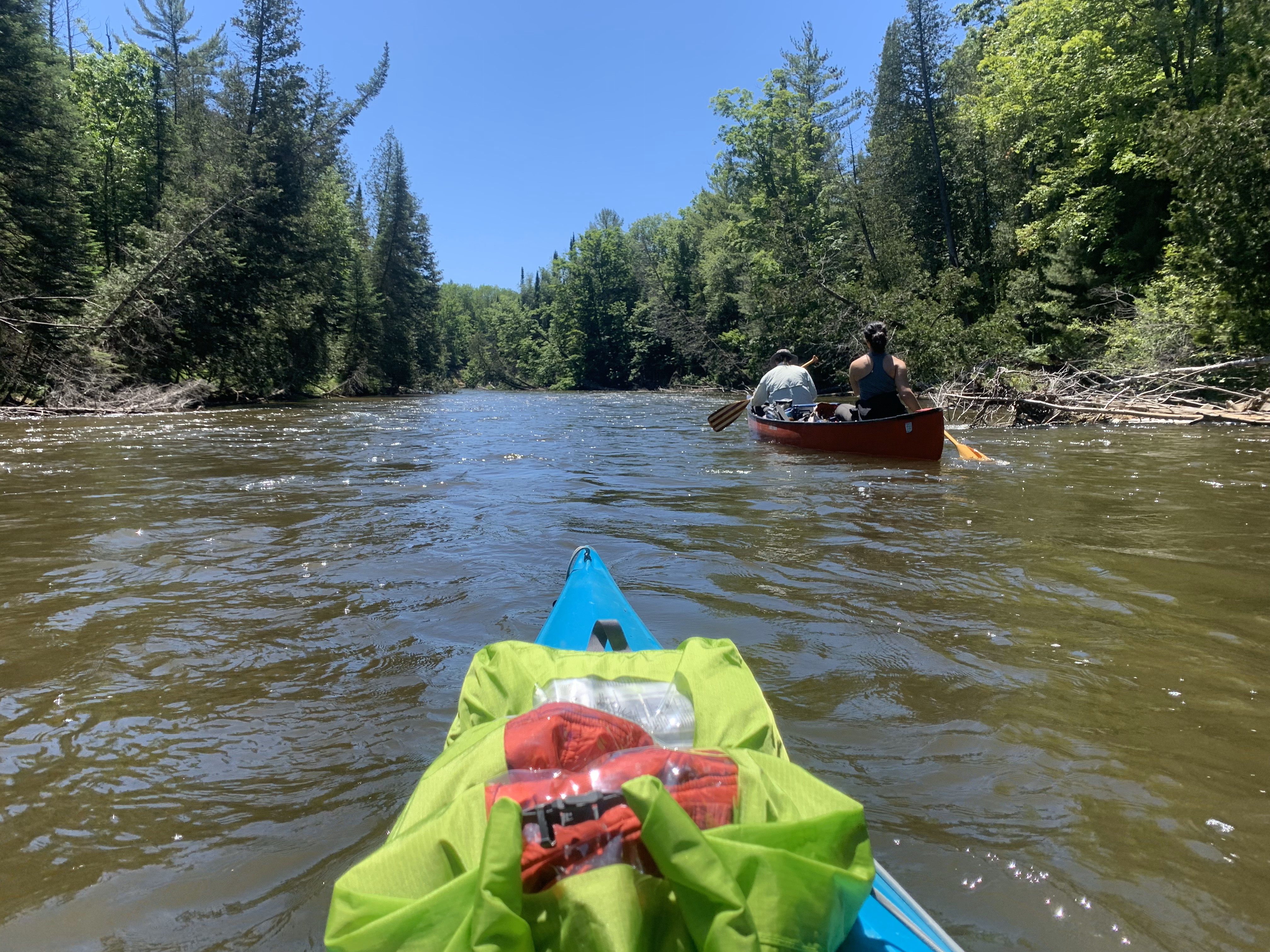Dean's Update
June 21, 2024 - Aron Sousa, MD

Friends,
Last week, the update and I were on vacation. We went on an excellent 71-mile paddle down part of the upper Manistee River with my son and one of his college buddies. It really was so much fun: we saw beaver, eagles, and ducklings TNTC, and we cooked a version of no-knead flat bread on a camp stove. If you will allow me to show off my thermodynamic skills, I am particularly proud that at the end of the three-day paddle, we opened the cooler, which I had stuffed with about 15 pounds of dry ice, and found the MSU Dairy Store ice cream sandwiches I packed before we left the house were exactly the right temperature for eating at that moment. Sublime parental mic drop.
There was also some work. As you might imagine, one does not head to the Manistee River and the Pere Marquette State Forest for excellent cell service. As we paddled along, my phone would occasionally accept a text or voice mail, even when there was no apparent service. Well, politicians looking for money seemed to land a text even when there were no bars on the phone. Oddly, I could often receive texts but not send texts until I had more than one bar, so I would have to wait until we went under the bridge of a major road to get enough service to text back. This to and fro gave the conversations of last week the interesting olde time cadence of communicating by telegram.
By the end of the week, I had signed on to a six-month gig to work with Norm Hubbard and the other deans on the next steps for our health sciences effort. You can find President Guskiewicz’s message here and the first message from Norm and I here. So, from July 1 until December 31, 2024, I will be executive dean. I will need your support and patience.
Meanwhile, I am still the dean of the college and as excited and honored as ever to have that role. As usual, I will do weekly deans updates and Town Halls. And to be clear, I will do those as dean rather than executive dean. Frankly, I am trying to thread the needle by wearing different hats or different fleeces for each role. So be it.
As many of you know, this was a busy week in our college:
- The university and Henry Ford Health celebrated the groundbreaking for the new $335 million research center. This building will be home to the current wet bench researchers at Henry Ford and the new hires envisioned by the partnership.
- The incredible work of Cara Poland, MD, MEd, was profiled on A1 of the Monday New York Times. Cara is the state’s leading physician in working on issues of addiction. She and her team also provide patient care in Grand Rapids, and free addiction education for students and clinicians across the state.
- With Jayne Ward, DO, chair of the Department of Neurology and Ophthalmology, on leave, John Goudreau, DO, PhD, will take on the role of interim chair in her absence. John has been at MSU since he was a student in Lyman Briggs and is director of the Michigan State Clinical Translational Science Institute among many other roles. Our hearts are with Jayne, and Dr. deJong and I appreciate John stepping in to help us all as interim chair.
- Next week, we host the Michigan State University Board of Trustees in Flint for their annual retreat. Our staff, faculty, and community partners in Flint have worked with the board and the administration on a remarkable series of events for the trustees and senior administrators in the university. We are excited to collaborate with our Flint partners on this retreat.
For close readers of the update, you will know that I regularly read S.E.N.S.O.R (Sentinel Event Notification System For Occupational Risks), published since 1998 by Ken Rosenman, MD, and the good folks in Occupational and Environmental Medicine in our Department of Medicine. Their Summer 2024 issue focuses on occupational heat exposure. As always, it is a very interesting and useful read. There are some guidelines on length of work and rest at different temperatures, which is likely as useful for hobby gardeners and kids playing soccer as it is outdoor workers.
The newsletter includes a remarkable case report of a 39-year-old agricultural worker from southern Mexico, who was healthy on his entry examination when he came to this country with a guest worker H-2A visa. Shortly after arriving in Michigan, he was hospitalized with renal failure following four days of work in a hot asparagus field. He was placed on and required dialysis, but he died shortly after returning to Mexico because he could not access dialysis in his home community. Workers with this kind of visa are eligible for worker’s compensation, but that did not happen for him.
It is worth noting that there is understood, endemic, chronic kidney disease in agricultural workers who frequently work in very hot regions like those of his home community. The risks to the kidneys of work in high heat may be cumulative.
We all complained about the heat this week, but heat related injury disproportionately affects people from minority and underserved communities. People like me, and the vast majority of us in the college, who do indoor work, benefit from their labor and the risks they take. We know better, but as the world warms from our inaction, we have more and more work to do to help those in need.
Serving the people with you,
Aron
Aron Sousa, MD, FACP
Dean, Michigan State University College of Human Medicine

